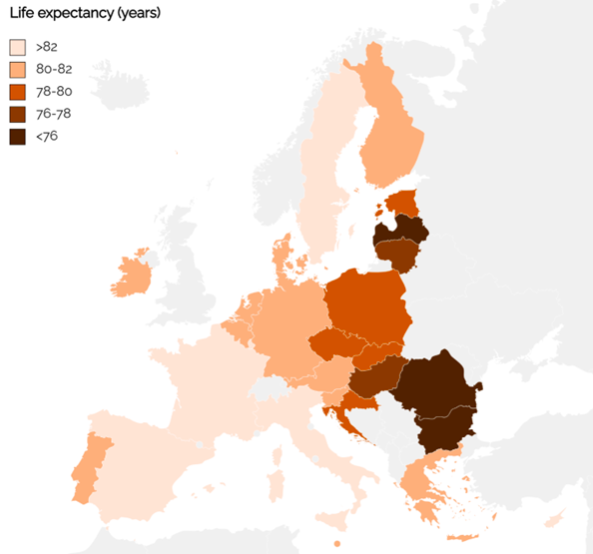Guest Article by Patrick Swain – Research and Development Manager, International Longevity Centre (ILC)
Europe’s population is ageing – by 2100, almost one in three EU citizens will be aged 65 or over [1].
Longer lives and higher life expectancy is a testament to modern medicine and the advances we have made in public healthcare. Yet longer lives don’t necessarily equate to healthier ones.
In fact, the International Longevity Centre UK’s (ILC) Healthy Ageing and Prevention Index suggests that the average EU citizen can expect to live for an average of 81.2 years, but their health span – that is, the number of years spent in good health – is just 70.7 years. This means that, on average, a person in the EU will spend 10.5 years of their life in poor health.
Across the EU, there are clear differences between Member States. For example, our Index shows that Sweden is the best performing country in the EU and ranks 4th globally, while Bulgaria ranks bottom of the EU and 56th globally. Swedes can expect to live 5.6 more years in good health than Bulgarians and work on average 3.9 more years.
Living longer is desirable, but not necessarily when those years gained are spent in poor health. Given the pressures facing health and social care services across Europe and the ongoing workforce crisis since COVID-19, investing more in prevention is an essential part of mitigating the challenges of an ageing society while supporting European healthcare systems.
Preventing ill health and promoting healthy ageing is crucial to ensure people across Europe remain physically, socially and economically active for longer. We know that those who remain in good health in later life can contribute more meaningfully to society, for example through volunteering and higher spending. Increasing preventative health spend by just 0.1% can unlock a 9% increase in annual spending by people aged 60+ and an additional 10 hours of volunteering [2].
So, while increasing prevention spending now may seem expensive to policymakers, it’s the long-term social and economic gains that need to be considered. Our Index suggests that only 1% of the global population is currently adapted to living longer, healthier lives. More must be done to inspire and engage policymakers to invest in population health, democratise access to health services, and use technology effectively so that we can all reap the benefits of preventative healthcare to live longer and healthier lives.
While health is a national competence, the EU has a responsibility to encourage its Member States to take more action now to ensure a healthier, happier, more prosperous society in the future. Moving beyond the European Parliament elections in June and into the 2024-29 political cycle, prevention needs to be a key priority in public health policymaking.
Sources:
Disclaimer: the opinions – including possible policy recommendations – expressed in the article are those of the author and do not necessarily represent the views or opinions of EPHA. The mere appearance of the articles on the EPHA website does not mean an endorsement by EPHA.

